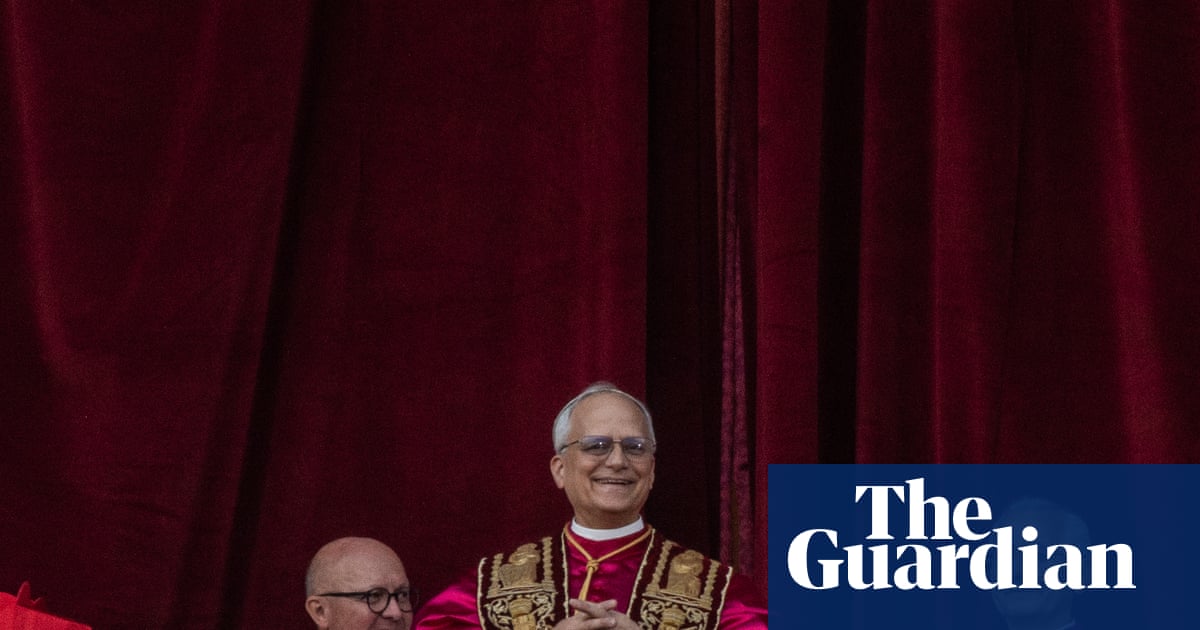After years of sympathetic and inclusive comments fromPope Francis, LGBTQ+ Catholics expressed concern on Thursday about hostile remarks made more than a decade ago by Father Robert Prevost, the newPope Leo XIV, in which he condemned what he called the “homosexual lifestyle” and“the redefinition of marriage” as “at odds with the Gospel”.
In a 2012 address to the world synod of bishops, the man who now leads the church said that “Western mass media is extraordinarily effective in fostering within the general public enormous sympathy for beliefs and practices that are at odds with the Gospel – for example abortion, homosexual lifestyle, euthanasia”.
In the remarks, of which he also read portions fora videoproduced by the Catholic News Service, a news agency owned by the United States Conference of Catholic Bishops, the cleric blamed mass media for fostering so much “sympathy for anti-Christian lifestyles choices” that “when people hear the Christian message it often inevitably seems ideological and emotionally cruel”.
“Catholic pastors who preach against the legalization of abortion or the redefinition of marriage are portrayed as being ideologically driven, severe and uncaring,” Prevost added.
He went on to complain that “alternative families comprised of same-sex partners and their adopted children are so benignly and sympathetically portrayed in television programs and cinema today”.
The video illustrated his criticism of the “homosexual lifestyle” and “same-sex partners and their adopted children” with clips from two US sitcoms featuring same-sex couples, The New Normal and Modern Family.
The cleric also called for a “new evangelization to counter these mass media-produced distortions of religious and ethical reality”.
After some of the comments were reported by the New York Times, AmericanLGBTQ+Catholic groups expressed alarm but also cautious optimism that the papacy of Francis had moved the whole church forward.
“We pray that in the 13 years that have passed, 12 of which were under the papacy of Pope Francis, that his heart and mind have developed more progressively on LGBTQ+ issues, and we will take a wait-and-see attitude to see if that has happened,” said Francis DeBernardo, the executive director of New Ways Ministry, a Maryland-based LGBTQ+ Catholic group, ina statement. “We pray that as our church transitions from 12 years of an historic papacy, Pope Leo XIV will continue the welcome and outreach to LGBTQ+ people which Pope Francis inaugurated.”
DignityUSA, a group that represents LGBTQ+ Catholics, also expressed “concern” with the pope’s previous comments butwrotein an online post: “We note that this statement was made during the papacy of Benedict XVI, when doctrinal adherence appeared to be expected. In addition, the voices of LGBTQ+ people were rarely heard at that level of church leadership. We pray that Pope Leo XIV will demonstrate a willingness to listen and grow as he begins his new role as the leader of the global church.”
Perhaps the best-known of the sympathetic statements made about LGBTQ+ Catholics by Pope Francis wasa commenthe made to reporters in 2013, when he was asked about hisobservationthat there was a “gay lobby” inside the Vatican hierarchy.
“I have yet to find someone who introduces himself at theVaticanwith an identity card marked ‘gay’,” the pope joked. “But we must distinguish the fact that a person is gay from the fact of lobbying, because no lobbies are good.”
“If a person is gay,” he added, “and he searches for the Lord and has goodwill, who am I to judge?”
DeBernardo, the New Ways Ministry director, referenced those remarks on Thursday.
Sign up toHeadlines US
Get the most important US headlines and highlights emailed direct to you every morning
after newsletter promotion
“The healing that began with ‘Who am I to judge?’ needs to continue and grow to ‘Who am I, if not a friend to LGBTQ+ people?’” DeBernardo said.
“Pope Francis opened the door to a new approach to LGBTQ+ people; Pope Leo must now guide the church through that door,” he added. “Many Catholics, including bishops and other leaders, remain ignorant about the reality of LGBTQ+ lives, including the marginalization, discrimination, and violence that many still face, even in Catholic institutions. We hope that he will further educate himself by meeting with and listening to LGBTQ+ Catholics and their supporters.”
Marianne Duddy-Burke, the executive director of DignityUSA,told the Washington Bladein a text message from St Peter’s Square shortly after Leo XIV’s election that the new pope “hasn’t said a lot since early 2010s” on the subject, adding “hope he has evolved”.
Father James Martin, an American Jesuit and the founder of Outreach, an LGBTQ+ Catholic resource, sounded a note of optimism ina video messagefrom Rome, calling the new pope a “down-to-earth, kind, modest” man and “a great choice”.
In 2023, Martin was able to bless a same-sex couple for the first time, after Pope Francis saidhe would allow such blessings.
In 2020, Pope Francissaidthat he supported civil-union laws for same-sex couples. “Homosexuals have a right to be a part of the family. They’re children of God and have a right to a family. Nobody should be thrown out, or be made miserable because of it,” he said.
“Pope Francis did more for LGBTQ people than all his predecessors combined,” Martinwrotelast month. “He wroteletters of welcometo Outreach conferences for LGBTQ Catholics. He approved the publication of ‘Fiducia Supplicans, a Vatican document that permitted priests to bless same-sex marriages under certain circumstances – and weathered intense blowback from some parts of the church. And, perhaps most surprisingly and least well known,he met regularlywith transgender Catholics and spoke to them with warmth and welcome.”
